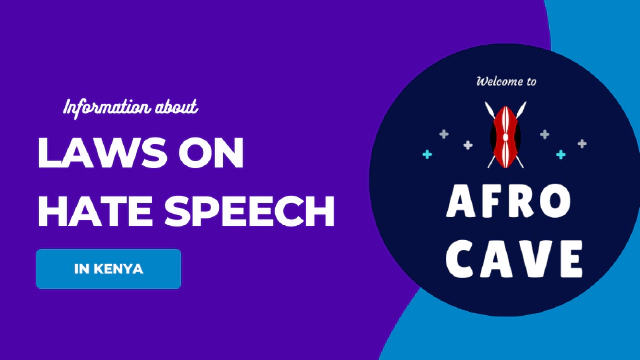The laws on hate speech in Kenya relate to the freedom of expression. Article 33(2) (c) of the Constitution deals with hate speech. The National Cohesion and Integration Commission (NCIC) Act further extends the definition of hate speech.
Table of Contents Show/Hide
Laws that define hate speech in Kenya
Article 33(2) subsection (c) of the Constitution states that the right to freedom of expression does not extend to hate speech
Section 13 of The National Cohesion and Integration Commission Act forms the basis of a more formidable explanation for hate speech laws in Kenya. Section 13(1) defines hate speech as–
- use of threatening, abusive or insulting words or behaviour;
- display of any written material;
- Publication or distribution of written material;
- presenting or directing the performance of the public performance of a play;
- distributing, showing or playing, a recording of visual images; or
- providing, producing or directing a programme,
Which is–
- threatening, abusive or insulting or;
- Involves the use of threatening, abusive, or insulting words or behaviour;
Which intends to–
- stir up ethnic hatred, or
- Having regard to all the circumstances – is likely to stir up ethnic hatred.
Under this section, the punishment for hate speech in Kenya is a fine not exceeding one million shillings or imprisonment for a term not exceeding three years or both.
The National Cohesion and Integration Commission Act clarifies that “ethnic hatred “under section 13 means hatred against a group of persons defined by reference to colour, race, nationality (including citizenship) or ethnic or national origins.
Other laws that relate to hate speech
Article 33(2) subsection (d) of the Constitution states that the right to freedom of expression does not extend to the advocacy of hatred that–
- constitutes ethnic incitement, the vilification of others or incitement to cause harm; or
- Is based on any ground of discrimination specified or contemplated in Article 27 (4).
The grounds in Article 27(4) include race, sex, pregnancy, marital status, health status, ethnic or social origin, colour, age, disability, religion, conscience, belief, culture, dress, language or birth.
Other laws that deal with the violation of freedom of expression include laws on libel (written), slander (spoken) and defamation.
The Penal Code
Section 77(3)(e) of the Penal Code provides that:
- (1) Any person who does or attempts to do, or makes any preparation to do, or conspires with any person to do, any act with a subversive intention, or utters any words with a subversive intention, is guilty of an offence and is liable to imprisonment for a term not exceeding three years…
- (3) For the purposes of this section, ‘subversive’ means… (e) intended or calculated to promote feelings of hatred or enmity between different races or communities in Kenya: Provided that the provisions of this paragraph do not extend to comments or criticisms made in good faith and with a view to the removal of any causes of hatred or enmity between races or communities.’
The Penal Code also contains laws that relate to incitement to violence and disobedience of the law. Section 96 of the Penal Code states that “Any person who, without lawful excuse, the burden of proof whereof shall lie upon him, utters, prints or publishes any words, or does any act or thing, indicating or implying that it is or might be desirable to do, or omit to do, any act the doing or omission of which is calculated-
- to bring death or physical injury to any person or to any class, community or body of persons; or
- to lead to the damage or destruction of any property; or
- to prevent or defeat by violence or by other unlawful means the execution or enforcement of any written law or to lead to defiance or disobedience of any such law, or of any lawful authority,
is guilty of an offence and is liable to imprisonment for a term not exceeding five years.”

